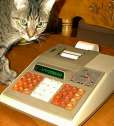Sharp PC-1211
| Datasheet legend
Ab/c:
Fractions calculation
AC: Alternating current BaseN: Number base calculations Card: Magnetic card storage Cmem: Continuous memory Cond: Conditional execution Const: Scientific constants Cplx: Complex number arithmetic DC: Direct current Eqlib: Equation library Exp: Exponential/log functions Fin: Financial functions Grph: Graphing capability Hyp: Hyperbolic functions Ind: Indirect addressing Intg: Numerical integration Jump: Unconditional jump (GOTO) Lbl: Program labels LCD: Liquid Crystal Display LED: Light-Emitting Diode Li-ion: Li-ion rechargeable battery Lreg: Linear regression (2-var. stats) mA: Milliamperes of current Mtrx: Matrix support NiCd: Nickel-Cadmium recharg. batt. NiMH: Nickel-metal-hydrite rech. batt. Prnt: Printer RTC: Real-time clock Sdev: Standard deviation (1-var. stats) Solv: Equation solver Subr: Subroutine call capability Symb: Symbolic computing Tape: Magnetic tape storage Trig: Trigonometric functions Units: Unit conversions VAC: Volts AC VDC: Volts DC |
| ||||||||||||||||||||||||||||||||||||||||||||||||||||||||
 This beautiful calculator is one of the first BASIC programmable pocket computers from Sharp. Its age is evident from the fact that the display is an early, yellow LCD; that characteristic color is due to an filter that was used to protect early liquid crystal displays from ultraviolet light.
This beautiful calculator is one of the first BASIC programmable pocket computers from Sharp. Its age is evident from the fact that the display is an early, yellow LCD; that characteristic color is due to an filter that was used to protect early liquid crystal displays from ultraviolet light.
Perhaps the only drawback of these calculators is the fact that there are no keyboard shortcuts; all advanced and scientific functions must be spelled out on the small QWERTY keyboard, making the machine slightly cumbersome to use.
Other than that, the PC-1211 is a pleasant, capable little BASIC calculator. With over two kilobytes of program memory, and efficient tokenized program storage, reasonably complex programs can be built. The external interface is used with a printer/cassette interface, letting the user save programs and create hardcopy output.
The programming model of this calculator is demonstrated by the following implementation of the Gamma function. This program computes the natural logarithm of the Gamma function for all positive and negative arguments to 10 digits of precision:
100:INPUT Z 110:S=SGN Z 120:X=ABS Z 130:G=1 140:IF X>5THEN 180 150:G=GX 160:X=X+1 170:GOTO 140 180:G=X*LN X-X+LN (√(2π/X)/G)+((((1/99/X/X-1/140)/X/X+1/105)/X/X-1/30)/X/X+1)/X/12 190:IF S>0THEN 220 200:RADIAN 210:G=LN (-π/Z/SIN πZ)-G 220:PRINT "LNG(Z)=",G


